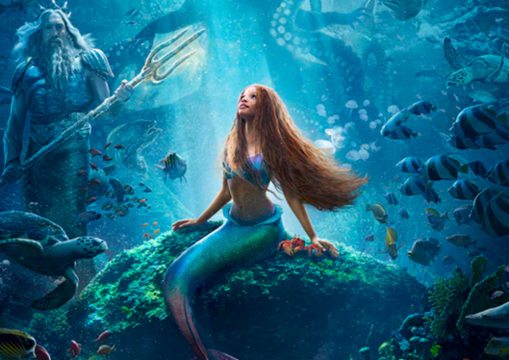

Disney’s Wheel of Unnecessary Remakes turns and lands on The Little Mermaid. A meeting room of executives shrug and send a courier to Rob Marshall, of Chicago and Mary Poppins Returns fame. We imagine he dejectedly thumbs through the $100 bills in the envelope and puts on his Making Movie pants. So begins the journey to The Little Mermaid, the 2023 edition.
It’s hard to imagine that anyone is still enthused about these live action remakes. Barely anyone watched Peter Pan & Wendy, Pinocchio was a borderline disaster (not the Guillermo del Toro one, that was a delight), we don’t talk about Mulan, The Lion King was about as redundant as a movie can get, and most people can’t even recall Lady and the Tramp. It’s a parade of naffness. Only Cruella has even a smidgeon of merit to it, and you’d be hard-pushed to call that a remake.
It’s not exactly auspicious for The Little Mermaid. Already courting controversy by daring to put Halle Bailey, a black actress, in the role of Ariel (dear gods people, grow up), it feels like it’s being set up to fail. But does it fail on cinematic terms? Now, that’s a complicated question that we’ve been chewing over.
In the broadest terms, this is The Little Mermaid, the 1990 animated classic reshot in live action. We know that might feel like an obvious statement, but it’s worth making. This is the same plot with the same characters, yearning for the same things, with the same results. This is not taking a different perspective, as Peter Pan & Wendy does, nor does it attempt anything new like Cruella. It’s pretty straight down the line: a trident’s throw at the target.
What it is doing, instead, is fluffing The Little Mermaid’s pillow. Things are bulked out, new songs are added in, and some two-dimensional elements begin to look a little more three-dimensional. Eric is probably the biggest beneficiary. In the animated movie, he was all teeth and quiff, some surface totty for Ariel to lust after. Here, he’s charming and likable, but now he’s given the burden of being a good prince, an impending rule, a desire to do right by people, and a sense that he owes Ariel for saving his life. He’s dragged about by being such a dang good person, and even gets a new song from Lin Manuel Miranda, called Wild Uncharted Waters. Actor Jonah Hauer-King leaps on the opportunity and makes him a likable goof.
There are other additions, most of which are pretty good, actually. Eric’s kingdom (never named, oddly) gets a Caribbean-feel and we get to see the bustle of the marketplace. Scuttle the seagull (Awkwafina) gets a home-run of a comedy song in Scuttlebutt, and Ariel receives ‘For the First Time’, which fits so snugly that we had to check that it wasn’t on the original soundtrack. Only the addition of Ariel’s sisters, all given speaking parts, missed the target for us. They’re mostly there to agree with Javier Bardem’s Triton and sell some toys.
Which should mean an overall improvement to the original film, right? Unfortunately, that’s not quite how it works. Because while they are all independently fine, we still couldn’t shake that huge ‘but why?’ that hovers over the film at all times.
One reason for The Little Mermaid’s existence might have been modern technology, and what it could bring to the underwater realm of Atlantica. CGI should have had a field-day with this lush ecosystem. But The Little Mermaid falls into the same vents as The Lion King. Flounder should have been a cuddly sidekick, but is a blank-faced guppy because the creators decided that realism was the order of the day. An animal from the Sealife Centre can’t hope to carry the personality of the original cartoon character. Sebastian the Crab is better, mainly because his eye-stalks can carry a modicum of character, but it’s still a far cry from Samuel E Wright’s original.
And there’s something off about the movements of the mercharacters. We’ve watched and rewatched certain sequences to try to figure it out: why is it creeping us out so much? We’ve narrowed it down to faces. Clearly, the faces are the real actors and their performances, but they don’t feel like they react to the sudden and fitful movements of their fish bodies. Their performances feel like they are projected onto porcelain dishes that are being worn by synchronised swimmers, and it all feels incredibly off.
But most of all, it’s all just so earnest. Everyone wants things so deeply, and they’re either maudlin when they don’t get it (cue song) or elated when they do (cue song). The Little Mermaid dearly needed something to lubricate all the straight-faced emotion, and while Melissa McCarthy as Ursula and Scuttle both try to do exactly that, it’s too big a task for them. They’re mostly cosplaying bigger and better performances.
A sidebar to talk about Halle Bailey, who’s been getting unfair criticism for her portrayal of Ariel. She’s completely game for taking on Ariel who is, if we’re being honest, something of a wet character even in the Disney original (she wants to live away from her family because she likes knick knacks and fancies a different species?). She’s got the singing covered – there’s no issues there – and her chemistry with Jonah Hauer-King is believable, even without the ability to talk. She’s good, basically, and none of the faults of this remake have anything to do with her.
Those faults started in the C-Suite of Disney. The Little Mermaid (2023) is a remake that didn’t need to happen, with the only battle-plan for its existence being a plumping of the soundtrack and script. Everyone, from Halle Bailey to Rob Marshall, give it their all, but the feeling of redundancy is unshakeable. And please, can we stop with the real-life animals taking over from cartoon counterparts? Nobody’s going to chuckle at a fish with a CGI mouth.
- SEO Powered Content & PR Distribution. Get Amplified Today.
- PlatoData.Network Vertical Generative Ai. Empower Yourself. Access Here.
- PlatoAiStream. Web3 Intelligence. Knowledge Amplified. Access Here.
- PlatoESG. Automotive / EVs, Carbon, CleanTech, Energy, Environment, Solar, Waste Management. Access Here.
- PlatoHealth. Biotech and Clinical Trials Intelligence. Access Here.
- ChartPrime. Elevate your Trading Game with ChartPrime. Access Here.
- BlockOffsets. Modernizing Environmental Offset Ownership. Access Here.
- Source: https://www.thexboxhub.com/the-little-mermaid-film-review/
- :has
- :is
- :not
- $UP
- 1
- 2023
- a
- ability
- About
- Action
- actors
- actress
- actually
- added
- addition
- additions
- After
- AI
- All
- already
- an
- and
- animal
- animals
- anyone
- anything
- ARE
- AS
- At
- away
- BAILeY
- Basically
- BE
- because
- been
- begin
- being
- beneficiary
- Better
- Big
- bigger
- Biggest
- Bills
- Black
- bodies
- both
- bring
- burden
- but
- by
- C-suite
- call
- called
- CAN
- Can Get
- carry
- cartoon
- centre
- certain
- CGI
- character
- characters
- check
- chemistry
- chicago
- cinematic
- classic
- clearly
- Comedy
- completely
- complicated
- content
- controversy
- could
- covered
- creators
- criticism
- day
- decided
- delight
- desire
- different
- disaster
- Disney
- do
- does
- Dont
- down
- e
- ecosystem
- edition
- either
- elements
- end
- Ether (ETH)
- Even
- everyone
- exactly
- executives
- faces
- FAIL
- Falls
- FAME
- family
- far
- Far Cry
- faults
- feel
- Figure
- Film
- fine
- First
- Fish
- For
- from
- game
- get
- getting
- Give
- given
- GODS
- going
- good
- Grow
- had
- happen
- Hard
- Have
- he
- her
- here
- High
- him
- his
- hope
- How
- HTTPS
- huge
- if
- imagine
- impending
- improvement
- in
- incredibly
- independently
- instead
- into
- issues
- IT
- ITS
- jonah
- journey
- just
- King
- Kingdom
- Know
- lady
- lands
- leaps
- Life
- like
- likes
- lin
- Line
- Lion
- little
- live
- Look
- mainly
- MAKES
- Making
- marketplace
- max-width
- mean
- meeting
- Merit
- might
- missed
- Modern
- more
- most
- mostly
- mouth
- movements
- movie
- much
- Named
- Need
- needed
- never
- New
- no
- None
- nor
- now
- obvious
- oddly
- of
- off
- on
- ONE
- only
- Opportunity
- or
- order
- original
- Other
- out
- over
- overall
- PAN
- parts
- People
- performances
- person
- Personality
- perspective
- Peter
- plato
- Plato Data Intelligence
- PlatoData
- please
- pretty
- Prince
- probably
- projected
- put
- Puts
- question
- React
- real
- realm
- reason
- receives
- remakes
- Results
- returns
- review
- right
- rob
- Role
- Room
- Rule
- same
- saving
- see
- sell
- send
- sense
- set
- she
- should
- shrug
- Sidekick
- So
- some
- something
- song
- soundtrack
- speaking
- started
- Statement
- Still
- Stop
- straight
- such
- sudden
- Surface
- taking
- Talk
- Target
- Task
- Technology
- terms
- that
- The
- The Lion
- their
- Them
- There.
- These
- they
- things
- this
- three-dimensional
- Through
- times
- to
- too
- Triton
- try
- turns
- uncharted
- underwater
- unfair
- unfortunately
- us
- wants
- was
- Waters
- we
- What
- Wheel
- when
- which
- while
- WHO
- why
- Wild
- with
- without
- works
- worth
- zephyrnet











